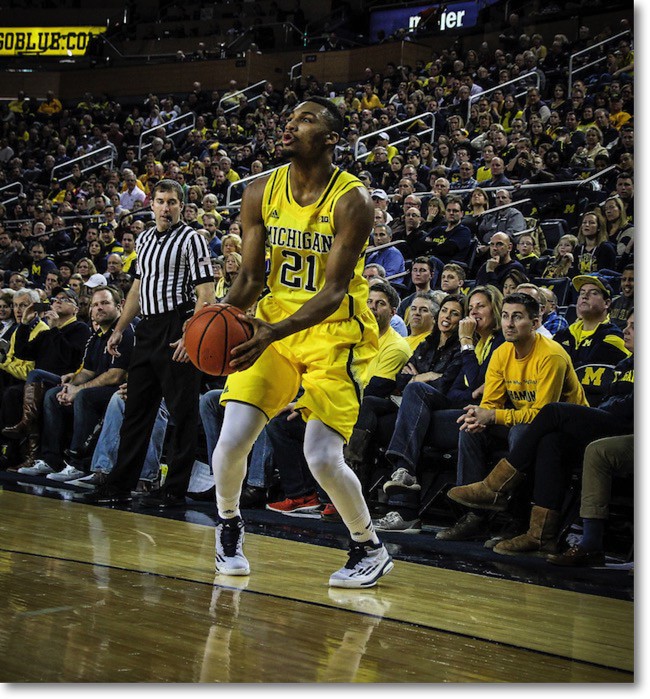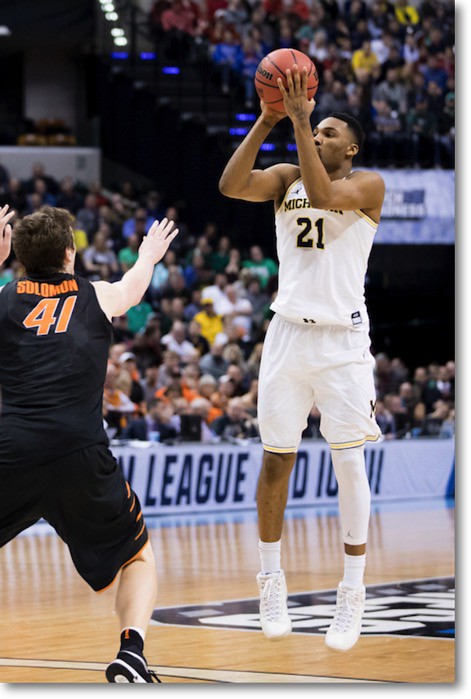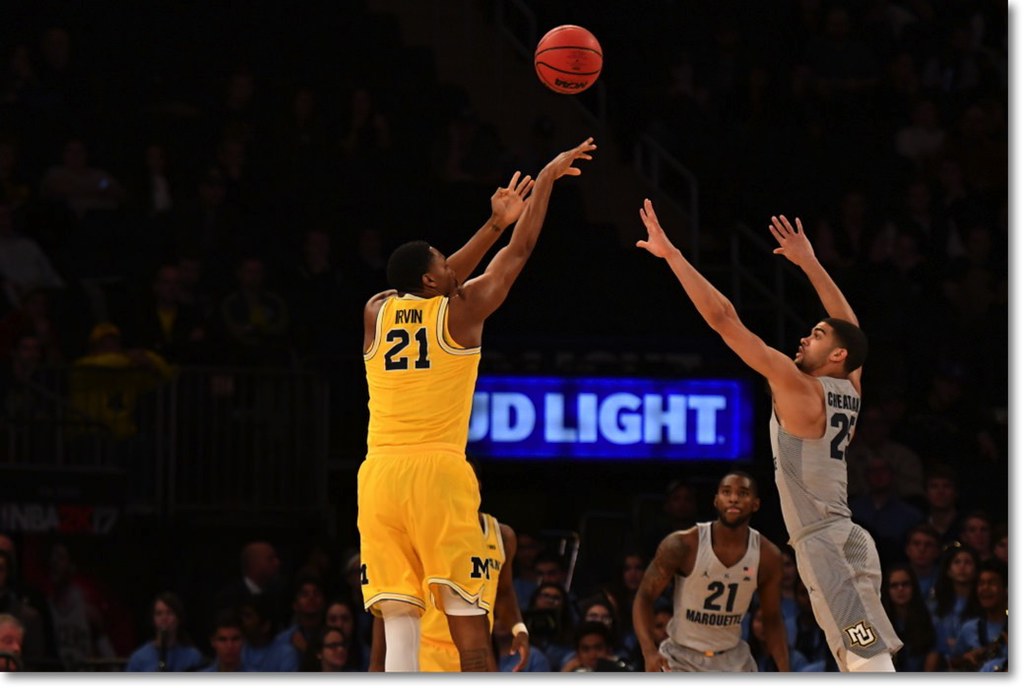


Unorthodox. [Eric Upchurch, Marc-Gregor Campredon, Joseph Dressler]
Zak Irvin made six hundred field goals at Michigan. Each one seemed like a minor miracle.
I say this out of admiration. Pick up a basketball, head to the park, and try to replicate Irvin's shot. To do this, stand pigeon-toed while holding the basketball low and in front of you like a hot casserole just out of the oven; with your hands on the sides of the ball, swing it above your head on a path that passes by your left front pocket; as the ball rises in front of your face, rotate your hands so your shooting hand is under the ball; lock your elbows at a 90-degree angle; flick your wrist to release at the apex of your jump; hold your follow-through at a 45-degree angle. It'll look something like this:
You won't make it. Certainly not the first time, and probably not on the hundredth, either.
Perhaps it shouldn't have been a surprise that Irvin's career was for a long time defined by its inconsistency.
After Irvin's freshman year, it was difficult to keep expectations in check. On a 2013-14 team loaded with NBA talent, he excelled in the role of unabashed gunner off the bench. He hoisted 146 three-pointers and made 43% of them, seamlessly replacing Nik Stauskas, who'd become the team's star, as the instant offense freshman who promised a whole lot more in the future.
Irvin's game, however, was extremely limited. He recorded all of 13 assists in 37 games. His defensive rebound rate was lower than Spike Albrecht's. Nearly 75% of his shots came from beyond the arc; according to hoop-math, all ten of his makes at the rim were assisted.
[Hit THE JUMP.]
 Irvin embraced the dirty work while wearing ugly shorts. [Patrick Barron]
Irvin embraced the dirty work while wearing ugly shorts. [Patrick Barron]
If you tuned out of the intervening two seasons, you'd be excused for not recognizing the senior version of Zak Irvin. The early draft entries of Stauskas and Glenn Robinson III, in conjunction with two injury-plagued years for Caris LeVert, forced Irvin to take on a significant scoring load while gradually adding to his repertoire.
Irvin's all-around development was masked, however, by his decreasingly accurate shooting. His three-point percentage dipped to 35% in his sophomore year, then bottomed out at 30% for a junior season in which he played with a bothersome back injury. He didn't have the off-the-dribble game of Stauskas or LeVert, the players whose development track he was expected to follow. His efficiency lagged. Michigan missed the tournament in his sophomore year, then barely made the field the next.
As Irvin became the most criticized player in the program, he quietly rounded into more than just a shooter. Michigan needed a starting power forward on the young, undersized 2014-15 squad. Irvin, a natural shooting guard, stepped in. Akin to Zack Novak on Blake Griffin, he'd occasionally find himself in comical post matchups against the likes of Frank Kaminsky. He doubled his rebound rate; ditto his assist rate.

Irvin led the team in scoring as a sophomore and junior. [Upchurch]
Irvin showed more growth as a junior, even as a shooting slump defined the first half of his season. He filled out his broad-shouldered frame, becoming a better defender and rebounder—no small development for a two/three still masquerading as a four. After LeVert broke his foot in the conference opener, Irvin took on more possessions as a high screen ballhandler. He dished out 59 assists in Michigan's 18 Big Ten games; he'd recorded 62 in his first two seasons.
While Kam Chatman's three-pointer to beat Indiana and earn an at-large bid became the most memorable play from that season, Irvin's own winning shot in the previous game proved more foretelling:
Over the next year, Irvin would develop that midrange pull-up from the shot Michigan fans most hated to see to one of the team's most reliable late-clock shots.
With the emergence of Moe Wagner and DJ Wilson, Irvin was afforded the luxury of playing on the wing for much of his senior year. For the first half of the season, he was the team's most productive and reliable scorer. He'd taken the lead.
Then Michigan started struggling, as did Irvin. The Wolverines started 4-6 in the Big Ten, and while many of their problems stemmed from awful defense by the other players, Irvin's outside shot abandoning him again didn't help. For Michigan to turn their season around, their senior captain and leading scorer would have to take a secondary role. With Irvin mired in his worst slump yet—in four games, he shot 4-for-31 from the field—many fans wanted him benched for Duncan Robinson. John Beilein knew better. Irvin was still the team's most important defensive player, capable of switching onto anyone on the court and holding his own. He'd made too many shots to not pull out of this nosedive.

Irvin developed into a steadying presence as a senior. [Campredon]
To his considerable credit, Irvin took a back seat to Derrick Walton and the Wagner/Wilson frontcourt, using fewer possessions than ever before. He eliminated the dreaded "heroball" shots from his arsenal. (Mostly, at least. Shooter's gonna shoot.) In doing so, he completed his transformation from gunner to glue guy. As Michigan surged down the stretch, Irvin rarely came off the court. He did a bit of everything: defending, rebounding, deferring, whatever the team needed at that particular moment. Scoring, too. His shot returned.
Over the final nine games of his career, Irvin averaged 14.7 points, 5.0 rebounds, and 2.5 assists in 37.4 minutes. He shot 65% on two-pointers, many of them his pet midrange pull-up, and 43% on three-pointers. Michigan went 7-2; both losses came down to the final possession. After Irvin's layup forced overtime in a Big Ten Tournament win over Purdue, Walton allowed MLive's Brendan Quinn to publish his impassioned off-the-record defense of his classmate and co-captain:
"All the (expletive) that people give Zak ... I hate it. I hate it so much. It's like, man, what else you want from the dude? What else do you want? He's played off back surgery. He's got, like, 1,500 career points. He's made a one-eighty as a player. I remember the days when Zak would shoot a contested 3 over two people rather than pass. He's a whole new guy. I mean, dude, are you kidding me? Get off my guy's back."
Irvin was a rock through Michigan's tourney run, nailing four triples in the shootout against Oklahoma State, making three of four second-half shots against Louisville, and pouring in 19 points while limiting Oregon star Dillon Brooks to 12. The team's run ended while he played the best ball of his career.
Walton will be remembered as the only guy the team wanted to take the season's final shot; Irvin should be remembered for finding the will to let that role go while transforming into an effective all-around player.
That, too, seemed like a minor miracle.